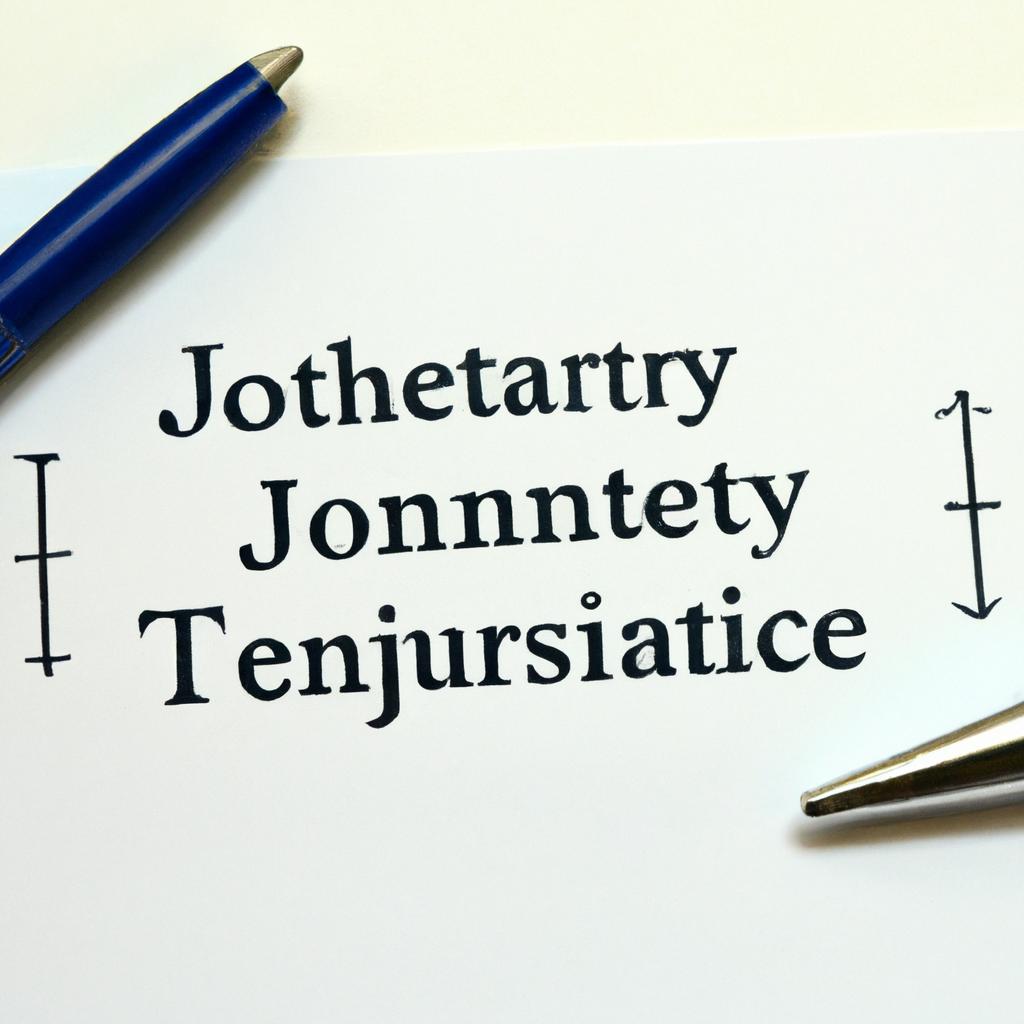In the intricate world of property ownership, the distinctions between joint tenancy and community property can have significant implications for individuals and families seeking to secure their assets for the future. As seasoned legal professionals at Morgan Legal Group in New York City, we understand the complexities of estate planning, probate, elder law, Wills, and trusts. Join us as we delve into the fundamental differences between joint tenancy and community property, shedding light on the nuances that can shape the course of your estate planning strategy.
Key Differences Between Joint Tenancy and Community Property
When it comes to property ownership, understanding the is crucial. Joint tenancy involves property ownership between two or more individuals with the right of survivorship. This means that if one owner passes away, their share of the property automatically transfers to the surviving owner(s). On the other hand, community property is a marital property ownership system where both spouses have an equal and undivided interest in all property acquired during the marriage.
One of the main differences between joint tenancy and community property is how property is divided upon the death of one of the owners. In joint tenancy, the deceased owner’s share automatically transfers to the surviving owner(s) without the need for probate. In contrast, with community property, each spouse’s share of the property is treated as separate property, and upon death, each spouse can pass on their share as they wish through a Will or trust.

Understanding the Implications of Joint Tenancy in Estate Planning
When it comes to estate planning, one of the key decisions to make is whether to hold property as joint tenants or as community property. While both options have their advantages and implications, it is essential to understand the differences between them. Joint tenancy is a form of co-ownership where two or more individuals own equal shares of property, with the right of survivorship. This means that when one owner passes away, their share automatically transfers to the surviving owner(s). In contrast, community property is a legal concept in some states where married couples are considered equal owners of all property acquired during the marriage, regardless of how it is titled.
One of the main implications of joint tenancy in estate planning is that it can help avoid probate and streamline the transfer of assets to the surviving owner(s) upon death. However, this can also lead to unintended consequences, such as disinheriting other heirs or exposing the property to creditors of the surviving owner(s). On the other hand, community property can provide spouses with equal ownership rights and potential tax benefits, but it may complicate the distribution of assets if one spouse wants to leave their share to someone other than their partner. Ultimately, the decision between joint tenancy and community property should be made based on individual circumstances and with the guidance of a knowledgeable estate planning attorney.

Analyzing the Benefits and Drawbacks of Community Property Ownership
When it comes to property ownership, two common forms that individuals may consider are joint tenancy and community property. Each option comes with its own set of benefits and drawbacks that should be carefully analyzed before making a decision.
- Joint Tenancy: In joint tenancy, each owner has an equal share of the property. This can provide a sense of security and assurance that the property will pass on to the surviving owner in the event of one owner’s death. However, joint tenancy may have limitations when it comes to estate planning and may not always allow for the desired distribution of assets.
- Community Property: Community property ownership allows spouses to jointly own property acquired during the marriage. This can simplify the transfer of assets upon death, as the property will automatically pass to the surviving spouse without the need for probate. However, community property may not be suitable for all couples, especially those with separate assets or liabilities.

Recommendations for Choosing Between Joint Tenancy and Community Property
When deciding between joint tenancy and community property, it’s essential to consider your specific circumstances and goals. Here are some recommendations to help you make an informed decision:
<ul>
<li><strong>Consider Your Relationship:</strong> Joint tenancy is typically preferred for spouses, while community property may be more suitable for business partners or family members who are not married.</li>
<li><strong>Review Tax Implications:</strong> Different ownership structures can have varying tax consequences, so it's crucial to consult with a tax advisor to understand how each option may impact your tax liability.</li>
</ul>
Q&A
Q: What is the difference between joint tenancy and community property?
A: Joint tenancy involves co-ownership of property with rights of survivorship, while community property involves shared ownership of assets acquired during a marriage.
Q: Can joint tenancy exist outside of a marriage?
A: Yes, joint tenancy can exist between any two or more individuals, regardless of their relationship.
Q: Are there tax implications for choosing joint tenancy or community property?
A: Yes, there can be tax implications for both joint tenancy and community property, depending on factors such as inheritance laws and state regulations.
Q: What happens to joint tenancy property in the event of a divorce?
A: In the event of a divorce, joint tenancy property may be divided between the co-owners or sold to divide the assets.
Q: Which option is better for estate planning purposes- joint tenancy or community property?
A: The choice between joint tenancy and community property for estate planning purposes depends on individual circumstances, such as the size of the estate and the specific needs of the co-owners.
Q: Can joint tenancy or community property be changed or converted after it has been established?
A: Yes, joint tenancy or community property can be changed or converted by legal means, such as a written agreement or court order.
Q: Are there any disadvantages to joint tenancy or community property?
A: Yes, there can be disadvantages to both joint tenancy and community property, such as potential conflicts between co-owners or restrictions on how the property can be used or transferred.
In Conclusion
In conclusion, when deciding between joint tenancy and community property, it is important to consider the unique benefits and drawbacks of each option. Whether you choose to hold property as joint tenants or as community property, it is crucial to understand the legal implications and consequences of your decision. By weighing the factors discussed in this article, you can make an informed choice that best suits your individual circumstances. Ultimately, the choice between joint tenancy and community property can have a significant impact on your financial future, so choose wisely.

